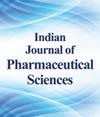Role of SAR1B on Modulation of Nasopharyngeal Carcinoma Progression via Negative Regulation of Target of Rapamycin Complex 1 Signaling
IF 0.4
4区 医学
Q4 PHARMACOLOGY & PHARMACY
Indian Journal of Pharmaceutical Sciences
Pub Date : 2023-01-01
DOI:10.36468/pharmaceutical-sciences.spl.684
引用次数: 0
Abstract
To speculate an autophagy gene, secretion associated Ras related guanosine triphosphatase 1B related signaling pathway for nasopharyngeal carcinoma based on both in vitro and in vivo experiments. 120 nasopharyngeal carcinoma biopsies (pathologically confirmed) were analyzed and the differentially expressed genes were explored. The internal molecular mechanism was further investigated using the human nasopharyngeal carcinoma cell lines, CNE1, HONE1 and C666-1. The cell proliferation capacity examination and the metabolic assays were performed in CNE1 cell line. The subcutaneous xenograft tumor mice model was also established. Secretion associated Ras related guanosine triphosphatase 1B demonstrated a remarkable decreased activity in nasopharyngeal carcinoma tissues compared with sibling paracancerous tissues. The key components in mammalian target of rapamycin complex 1 but not mammalian target of rapamycin complex 2 were greatly enhanced in nasopharyngeal carcinoma tissues. Moreover, the secretion associated Ras related guanosine triphosphatase 1B displayed a significant decreasing expression pattern and the mammalian target of rapamycin complex 1 kept an upward trend as the tumor, node and metastases stage progressed. The clinical significances for nasopharyngeal carcinoma tumor progression were calculated based on statistical analysis. The cell proliferation assay suggested that secretion associated Ras related guanosine triphosphatase 1B manipulated nasopharyngeal carcinoma cell proliferation via mammalian target of rapamycin complex 1/p70 ribosomal protein kinase 1 dependent signaling pathway. At the same time, transfection of secretion associated Ras related guanosine triphosphatase 1B small interfering ribonucleic acid could significantly enhanced the glycolytic capacity and glycolytic reserve of nasopharyngeal carcinoma cells compared with negative control. Silencing of secretion associated Ras related guanosine triphosphatase 1B promoted xenograft tumour growth, which could be greatly suppressed by rapamycin treatment in a dosage-dependent manner. The study shed a variety of insights for nasopharyngeal carcinoma from an innovative directionSAR1B通过负调控雷帕霉素复合体1信号靶调控鼻咽癌进展的作用
通过体外和体内实验推测鼻咽癌自噬基因、分泌相关Ras相关鸟苷三磷酸酶1B相关信号通路。对120例经病理证实的鼻咽癌活检进行分析,探讨差异表达基因。利用人鼻咽癌细胞系CNE1、HONE1和C666-1进一步研究其内部分子机制。对CNE1细胞株进行细胞增殖能力检测和代谢测定。建立小鼠皮下异种移植瘤模型。与同胞癌旁组织相比,Ras相关的鸟苷三磷酸酶1B在鼻咽癌组织中的分泌活性显著降低。哺乳动物雷帕霉素复合物1靶点的关键成分在鼻咽癌组织中显著增强,而非雷帕霉素复合物2靶点。随着肿瘤、淋巴结和转移期的进展,Ras相关鸟苷三磷酸酶1B的分泌呈明显的下降趋势,雷帕霉素复合物1在哺乳动物中的靶点呈上升趋势。通过统计学分析计算鼻咽癌进展的临床意义。细胞增殖实验表明,分泌相关Ras相关鸟苷三磷酸酶1B通过哺乳动物雷帕霉素复合体1/p70核糖体蛋白激酶1依赖信号通路调控鼻咽癌细胞增殖。同时,与阴性对照相比,转染分泌相关Ras相关鸟苷三磷酸酶1B小干扰核糖核酸可显著增强鼻咽癌细胞的糖酵解能力和糖酵解储备。抑制与Ras相关的鸟苷三磷酸酶1B的分泌可促进异种移植物肿瘤的生长,而雷帕霉素可以以剂量依赖的方式极大地抑制这种生长。该研究从一个创新的方向为鼻咽癌提供了多种见解
本文章由计算机程序翻译,如有差异,请以英文原文为准。
求助全文
约1分钟内获得全文
求助全文
来源期刊

Indian Journal of Pharmaceutical Sciences
PHARMACOLOGY & PHARMACY-
自引率
0.00%
发文量
0
审稿时长
2 months
期刊介绍:
The Indian Journal of Pharmaceutical Sciences (IJPS) is a bi-monthly Journal, which publishes original research work that contributes significantly to further the scientific knowledge in Pharmaceutical Sciences (Pharmaceutical Technology, Pharmaceutics, Biopharmaceutics, Pharmacokinetics, Pharmaceutical/Medicinal Chemistry, Computational Chemistry and Molecular Drug Design, Pharmacognosy and Phytochemistry, Pharmacology and Therapeutics, Pharmaceutical Analysis, Pharmacy Practice, Clinical and Hospital Pharmacy, Pharmacovigilance, Pharmacoepidemiology, Pharmacoeconomics, Drug Information, Patient Counselling, Adverse Drug Reactions Monitoring, Medication Errors, Medication Optimization, Medication Therapy Management, Cell Biology, Genomics and Proteomics, Pharmacogenomics, Bioinformatics and Biotechnology of Pharmaceutical Interest). The Journal publishes original research work either as a Full Research Paper or as a Short Communication. Review Articles on current topics in Pharmaceutical Sciences are also considered for publication by the Journal.
 求助内容:
求助内容: 应助结果提醒方式:
应助结果提醒方式:


